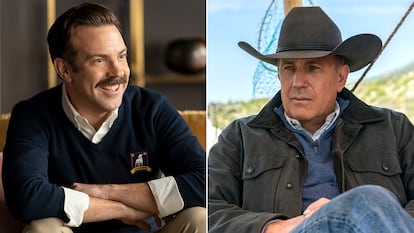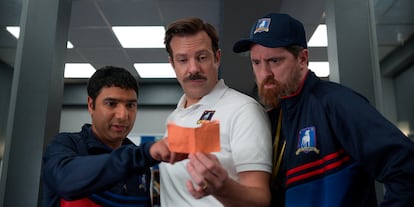Who’s more macho: ‘Ted Lasso’ or ‘Yellowstone’?
The two successful TV series have very different takes on gender roles

In one corner of the ring we have Ted Lasso (Apple TV+), an American soccer coach in England who gives cupcakes to his boss and urges his players to always be kind. In the other corner are the Duttons of Yellowstone (Paramount), a Montana ranch larger than some countries where the highest honor is getting your chest branded with the ranch’s insignia. The bell sounds and the boxing match for the tile of most macho TV series begins. Yet this particular match between TV heavyweights has unintentionally nurtured one of feminism’s greatest achievements — a critical examination of modern masculinity.
“Ted Lasso [played by Jason Sudeikis] is an understanding, loving coach who doesn’t try to hide his feelings and would never ask one of his players for a little kiss,” said Cristóbal Garrido, the screenwriter for Spain’s Cocaine Coast TV series. “But Yellowstone is a straight man’s ultimate fantasy. It’s a place where silent men roam freely without pausing for moments of introspection or other such annoyances. It’s like Jurassic Park with old cowboys instead of velociraptors. Ok — cowboys are also dangerous but a lot more fun.”

In Yellowstone, the characters lash out first and ask questions later. As nurses try to control a young Dutton’s anxiety attack, the father promptly assaults them without first asking what’s going on. Ted Lasso, on the other hand, urges his players to sing and dance to a sickly sweet song from The Sound of Music.
“Ted Lasso explores new forms of masculinity and engages with social issues. The male characters in the show often confront their deep-rooted patriarchal beliefs, adding a touch of humor along the way,” said Carmen Llano, a screenwriter on Spain’s The Promise and Acacias 38 TV series. “Is Yellowstone more believable or simply self-referential? Do the characters behave this way simply because they always have? Violence in real life is often funnier, more ridiculous and random than when it’s portrayed on television by larger-than-life people.”
The danger of falling into cliché
In both series, testosterone influences and coexists with female characters in different ways. While both productions depict men in family and work environments, their focus is very different. Ted Lasso showcases how power can emanate from femininity, while Yellowstone portrays the progressive masculinization of women, like opening up a Russian matryoshka doll. These reflections intertwine, and the danger of falling into cliché persistently lingers. Is femininity synonymous with looking elegant and well-dressed? Does power come from towering heels that elicit a sense of exhilaration? Not necessarily. And is a physically strong woman inherently masculinized? Definitely not. According to Carmen Llano, “You know, if we want to get picky here, it can be kind of annoying how we often think the only way to empower female characters is by giving them a certain role. But it’s all part of the process of building up female characters. We’re still figuring it out as we go since we don’t have many examples to go on. Not too long ago, all we did was change male characters to females and made them act all tough and stoic like men.” Cristóbal Garrido agrees. “The women in Yellowstone are real macho, like Beth Dutton. But her character is still fascinating because the actress who plays her [Kelly Reilly] is so amazing. It’s curious that her only dramatic flaw is infertility, as if motherhood is the sole defining characteristic for female characters.”
In Yellowstone and Ted Lasso, work is a background activity — the characters spend all their time talking, bonding and doing other things. “The world of work is no longer for men — it’s for both men and women,” said Alberto Vázquez Balañá, a coach and facilitator of high-performance teams. “Respect for coworkers is now a major goal in the working world. But there are still many men like Luis Rubiales who still don’t understand what harassment means… When a group lives and sleeps together, they end up thinking alike, and the one who doesn’t ends up leaving the team. You know what that means on Yellowstone, right?” Spoiler alert — they end up as carrion at the bottom of a ravine. “I prefer teams where we learn from mistakes and try different approaches to see if we can find a better way. That’s something I really love about the Ted Lasso world.”

After years of exploring the dark sides of male characters and even superheroes, filmmakers have recently started looking at the “good guy” archetype. Ted Lasso and Yellowstone both delve into this, although with subtle differences, says Cristóbal Garrido. “The thing with Yellowstone is, they don’t really talk to each other, much less about something like feminism. They push the whole family values theme while the characters bash each other silly. And the whole ecology thing… they blow up a river just to keep their land?” Carmen Llano says: “Creating an intriguing and authentic character can be challenging, regardless of whether they are good, bad or average. The key lies not in their morality, but in establishing a consistent moral compass.”
Ted Lasso recently bid farewell amid much acclaim, but the future of the hugely popular Yellowstone remains cloudy due to Kevin Costner’s disagreements with its screenwriter and production company. When analyzing the portrayal of masculinity in screen fiction, it becomes evident that everything isn’t as clear-cut as Barbie makes it out to be. In this Ted Lasso and Yellowstone match-up, crowning a winner is less interesting than contemplating unexpected twists. What if Ted made a surprise appearance on Yellowstone and led the cowboys in a song like Julie Andrews? Just something to think about.
Sign up for our weekly newsletter to get more English-language news coverage from EL PAÍS USA Edition
Tu suscripción se está usando en otro dispositivo
¿Quieres añadir otro usuario a tu suscripción?
Si continúas leyendo en este dispositivo, no se podrá leer en el otro.
FlechaTu suscripción se está usando en otro dispositivo y solo puedes acceder a EL PAÍS desde un dispositivo a la vez.
Si quieres compartir tu cuenta, cambia tu suscripción a la modalidad Premium, así podrás añadir otro usuario. Cada uno accederá con su propia cuenta de email, lo que os permitirá personalizar vuestra experiencia en EL PAÍS.
¿Tienes una suscripción de empresa? Accede aquí para contratar más cuentas.
En el caso de no saber quién está usando tu cuenta, te recomendamos cambiar tu contraseña aquí.
Si decides continuar compartiendo tu cuenta, este mensaje se mostrará en tu dispositivo y en el de la otra persona que está usando tu cuenta de forma indefinida, afectando a tu experiencia de lectura. Puedes consultar aquí los términos y condiciones de la suscripción digital.








































